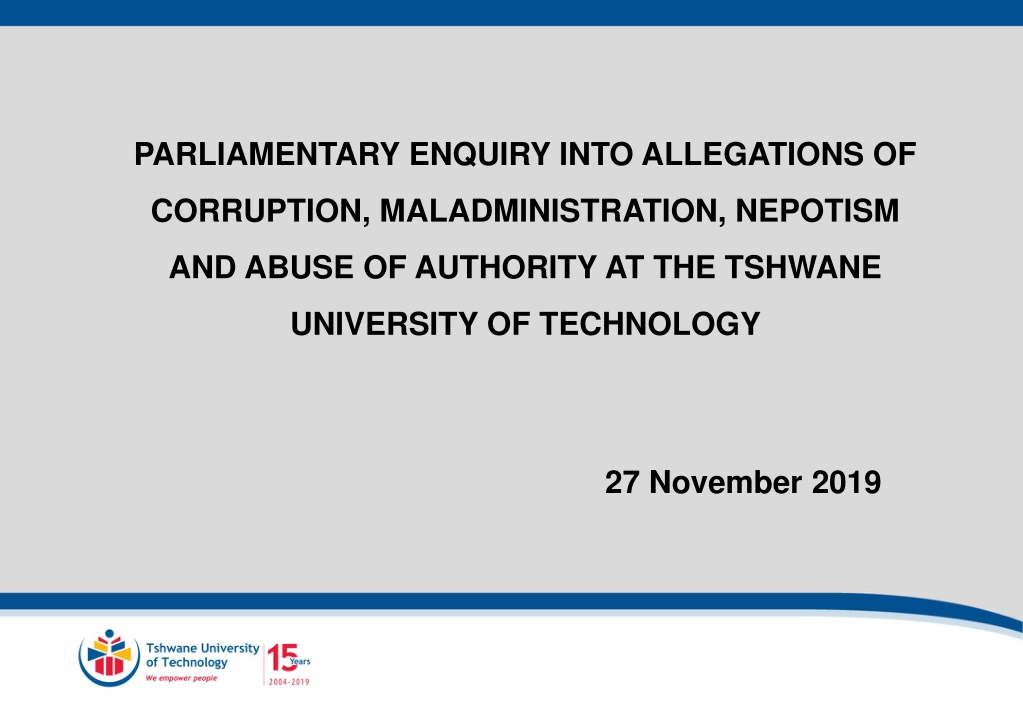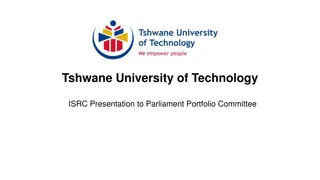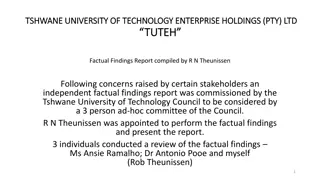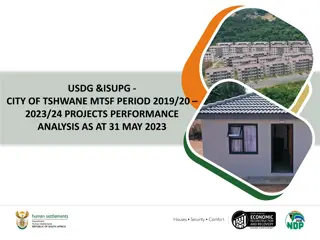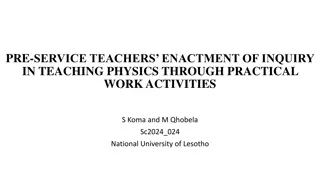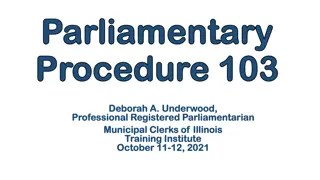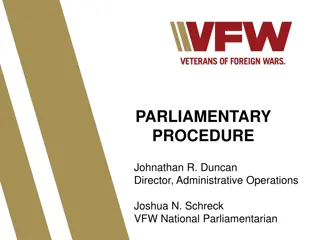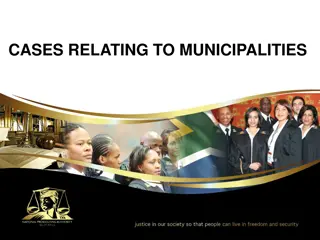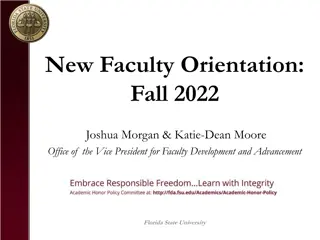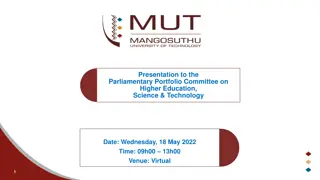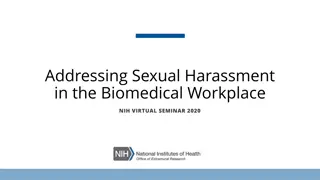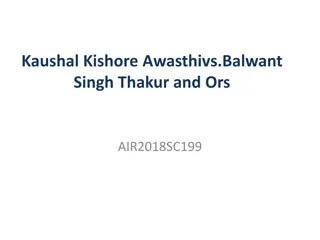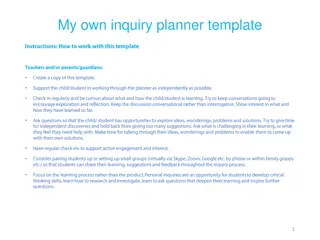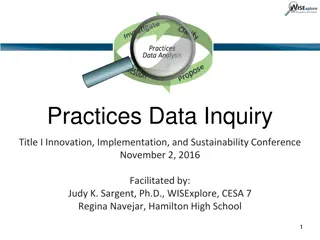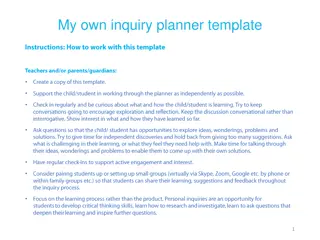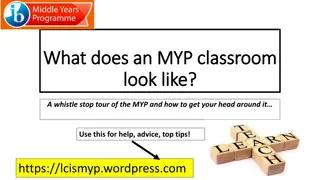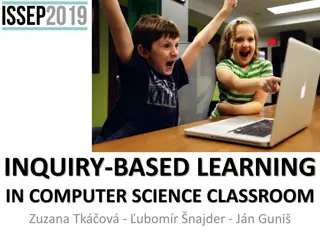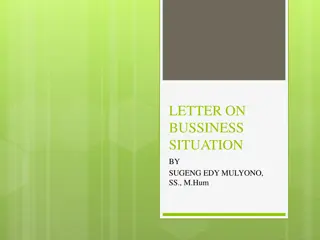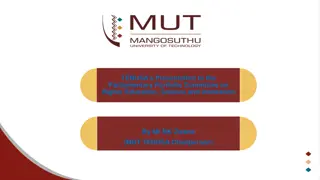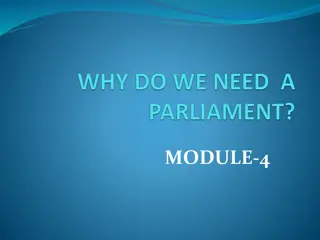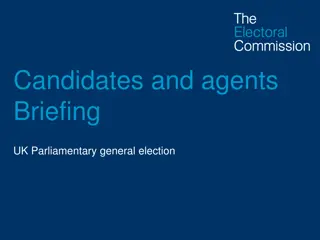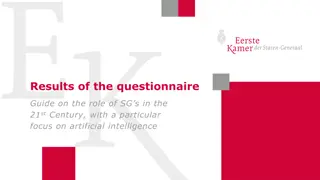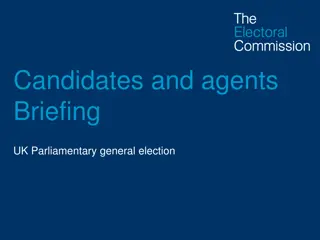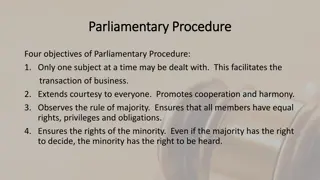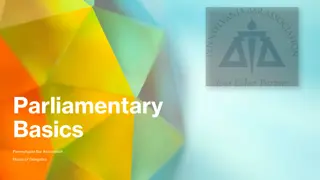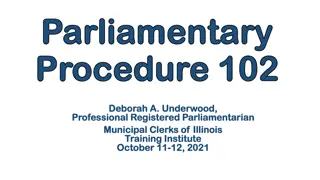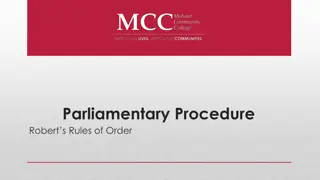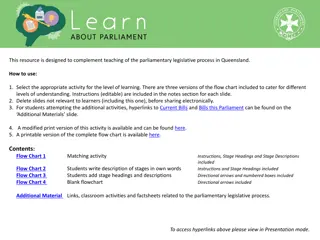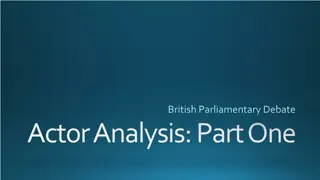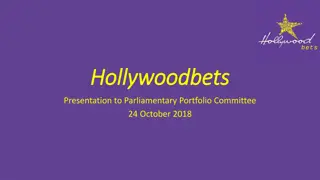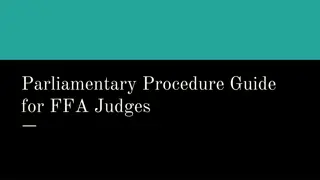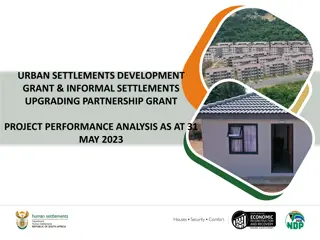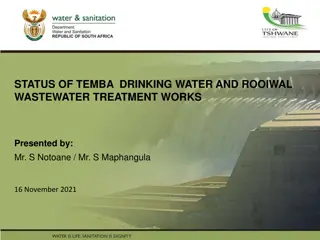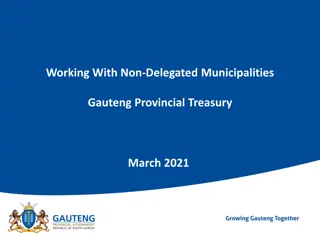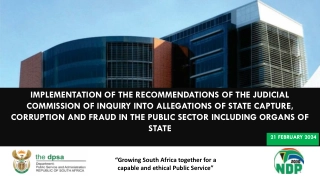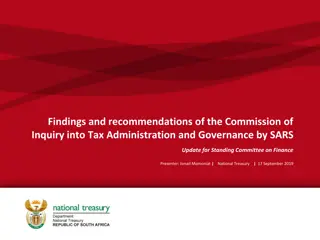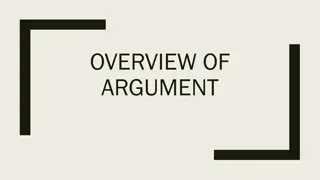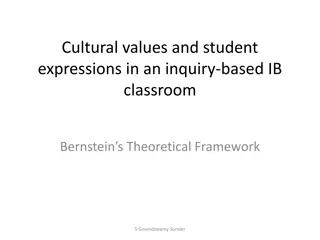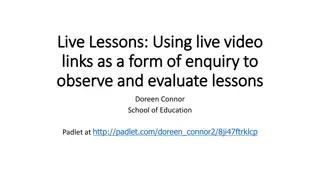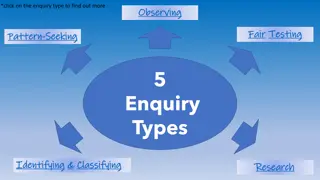Parliamentary Inquiry into Allegations at Tshwane University of Technology
The parliamentary inquiry delves into allegations of corruption, maladministration, nepotism, and abuse of authority at Tshwane University of Technology (TUT). It scrutinizes irregularities in the re-election of Dr. B. Masuku as Chairperson of the Council and examines the TUT Statute governing term limits. Legal advice sought regarding Dr. Masuku's third term re-election is also discussed, including an alleged disregarded legal opinion provided by a council member, Mr. Ronald Lamola.
Download Presentation

Please find below an Image/Link to download the presentation.
The content on the website is provided AS IS for your information and personal use only. It may not be sold, licensed, or shared on other websites without obtaining consent from the author. Download presentation by click this link. If you encounter any issues during the download, it is possible that the publisher has removed the file from their server.
E N D
Presentation Transcript
PARLIAMENTARY ENQUIRY INTO ALLEGATIONS OF CORRUPTION, MALADMINISTRATION, NEPOTISM AND ABUSE OF AUTHORITY AT THE TSHWANE UNIVERSITY OF TECHNOLOGY 27 November 2019
Part A: QUESTIONS ON THE ALLEGATIONS LEVELLED AGAINST THE TSHWANE UNIVERSITY OF TECHNOLOGY COUNCIL
Irregularities in the re-election of Dr B Masuku as the Chairperson of Council The re-election of Dr Bandile Masuku ( DrMasuku ) to a third term of service to the Council of Tshwane University of Technology did not violate or contravene any of the statutes of the University that govern the term of office of the Chairperson, neither was it unlawful In light of this background that details council s effort and focus on improving governance at TUT, it is taken with degree of exception that the Chair of Council would have; coerced the TUT Council into re-electing him for such third term; and instructed University management to obtain favourable legal advice to justify Dr Masuku s re-election.
The TUT Statute stipulates the following; 1. Section 11 of the TUT Statute regulates the term of office of the Chairperson and Deputy Chairperson. In terms of section 11(4), the Chairperson and Deputy Chairperson are elected to their respective offices for a period of two years. 2. Section 11(5) states as follows: The chairperson and the deputy chairperson are eligible for re-election for a maximum of two consecutive terms. In our interpretation of this provision, the two consecutive terms referred to in section 11(5) are in addition to the initial two year term provided for in section 11(4). In effect this means that the chairperson can serve a maximum term of 6 (six) years, or 3 (terms). 3. This understanding of the term limits is based on the wording of the applicable provisions, the fact that the initial term and the subsequent terms are provided for in separate sub-paragraphs in the TUT Statute, and in particular on the use of the term re-election , in section 11(5).
You have asked, in your letter at paragraph 1, Part A, why legal advice was sought on the issue of re-electing Dr Masuku for a third term as Chairperson, and to provide you with copies of the minutes of the meeting at which this decision was taken. In response, we note that the legal advice was sought not by the TUT Council but by the University Registrar in his capacity as the Secretary and Electoral Officer of Council and as such, the decision was not recorded in minutes (see Annexure K). The University Registrar sought this legal advice in order to advise the TUT Council on whether Dr Masuku could lawfully be re-elected for another term. In your letter at paragraph 1 of Part A, you state that it is alleged that a member of council who was a Practising attorney, Mr Ronald Lamola, was requested and provided a legal opinion which was disregarded by the TUT council because it was not in favour of the re-election of Dr. Masuku for a third term. This assertion is not true and we firmly deny this allegation. At no time was Mr Lamola requested by TUT management or Council to provide legal advice on the reelection of the Chair of Council, and at no time did Mr Lamola provide such a written legal opinion to TUT management or Council.
Irregularities in the appointment of the Vice-Chancellor 1. It is difficult to discern from your letter in what respect the process followed for appointment of the Vice Chancellor and Principal is alleged to be irregular, un- procedural, inconsistent with applicable laws or against legal advice. It is difficult even to discern which appointment is referred to, since the Vice Chancellor was first appointed on a temporary basis as Acting Vice Chancellor and Principal, and later on a fixed term contract as Vice Chancellor and Principal. We have assumed that the allegations in your paragraph 2 of Part A relate to the appointment as Vice Chancellor and Principal with effect from January 2018. 2. Notwithstanding the above, in relation to all of the (unsubstantiated and unexplained) allegations referred to in paragraph 2 of Part A of your letter, it is incorrect to argue that the process followed in the appointment of the Vice Chancellor and Principal was irregular or illegal. 3. Prior to the appointment of Prof Van Staden into the acting position, TUT was in a terrible state, in terms of overall governance, financial state and the morale of most students and staff. 4. TUT had been placed under administration, and the institution was not an employer of choice amongst academics with a credible record. 5. Prof Van Staden has accepted the acting role and in short space of time, had proven himself capable and passionate with the enormity of the task at hand.
The process followed was consistent with legal and regulatory requirements, which include the following: 1. section 34 of the Higher Education Act, which provides as follows: 34. Appointment and conditions of service of employees of public higher education institutions.-(1) The council of a public higher education institution must appoint the employees of the public higher education institution. (2) Notwithstanding subsection (1) the principal, any vice-principal and the academic employees of the public higher education institution must be appointed by the council after consultation with the senate. section 29(1)(c) of the TUT Statute, which provides that, The institutional forum must advise council on issues affecting the University, including the selection of candidates for senior management positions ;
section 55 of the TUT Statute, which provides as follows: 55. Appointment and term of office of vice-chancellor. (1) The council after consultation with the senate and the institutional forum appoints the vice-chancellor for a period of not more than five years. (2) Subject to section 31(1) of the Act, the advertising of the post, the invitation for nomination of candidates, the search for suitable candidates, the criteria for the shortlisting of candidates and the interviewing and appointment processes are in the manner determined in the institutional rules. ; and paragraph 1 of Part 2 of the TUT Institutional Rules, which provides as follows: 1. Selection and appointment of Vice-Chancellor 1) At least six months before the term of office of the Vice-Chancellor expires, or within fourteen days after a vacancy in the office of Vice-Chancellor occurs for any reason other than the expiry of the term of office, the Registrar informs Council of such expiry or vacancy. 2) The Council, at its meeting appoints a Senior Appointments and Selection Committee in accordance with the provisions of sub-rule (4) below.
3) The Senior Appointments and Selection Committee is responsible for the process of the selection and appointment of the Vice-Chancellor in accordance with the provisions of these rules. 4) The Senior Appointments and Selection Committee comprises the following members: a. the Chairperson of Council, b. the Vice-Chancellor, only where the vacancy is not that of Vice-Chancellor, c. seven external members of Council elected by Council, d. one member of Senate serving on Council, e. the non-senate academic employee serving on Council, f. the non-academic employee serving on Council, g. the President of the Central Student Representative Council, h. one member from each of the recognised unions.
5) A quorum is constituted by 50% plus one of the members of the Senior Appointments and Selection Committee, provided that the majority of the members present are external members of Council. 6) Council may, at its own discretion, appoint an external person with relevant expertise to be part of the Senior Appointments and Selection Committee provided that such a person may participate in the deliberations but may not vote. 7) Candidates and incumbents for a vacant position under consideration by the committee may not be members of the Senior Appointments and Selection Committee. 8) Once the Senior Appointments and Selection Committee has been constituted, no substitutions may be made, and the absence of any particular member does not invalidate the process, provided that the quorum of the committee is maintained at all meetings in terms of sub-rule 1(5). 9) The Senior Appointments and Selection Committee must select a candidate or candidates in order of preference, for recommendation to Council for appointment. 10) If the chairperson is not present at a meeting, the committee elects a chairperson from among the external members of Council present at the meeting.
11) The Senior Appointments and Selection Committee - a. identifies the specific competencies, characteristics and qualities that candidates for the post should possess; b. compiles a job description, if necessary; c. determines the format and contents of the advertisement, calling for applications and nominations; d. requests the Executive Director of Human Resources and e. Transformation to advertise the vacant post and to call for applications; and f. participates in the selection of the suitable candidates. 12) Candidates must commit themselves to the further procedures including, if short listed, to culture-free assessment techniques. 13) No later than 14 days after the closing date for applications, the Executive Director of Human Resources and Transformation calls a meeting of the Senior Appointments and Selection Committee to consider all applications received. 14) The Senior Appointments and Selection Committee considers all the applications received with a view to drawing up a short list of no more than five candidates. 15) In all deliberations, the members of the Senior Appointments and Selection Committee must strive to seek consensus.
16) If consensus is not reached on any matter before the Committee, the matter is decided by a simple majority vote of the members of the committee present. 17) The Senior Appointments and Selection Committee must, as soon as possible after the short list has been finalised, interview the candidates on the short list with a view of designating a candidate for recommendation to Council. 18) The provisions of Rule 1(14) and (15) apply, with the necessary changes, to the designation of a candidate. 19) If consensus is not reached regarding the designation of a candidate for recommendation to Council - a. each member of the Senior Appointments and Selection Committee evaluates the candidates on the short list, in writing, on a scale to be determined by the committee; b. the written evaluation of each member of the Senior Appointments and Selection Committee is handed to the Executive Director Human Resources and Transformation, who determines the total mark allocated to each candidate in terms of paragraph (a); and c. the Executive Director, Human Resources and Transformation declares the candidate who obtains the highest mark to be the designated candidate for recommendation to Council by the Senior Appointments and Selection Committee.
d. In the event of two or more candidates receiving equal scores the names of such candidates are submitted in alphabetical order to council as a recommendation from the Senior Appointments and Selection Committee. 20) The chairperson of the Senior Appointments and Selection Committee submits the name(s) and CVs of the recommended candidate(s), as well as the names of the remaining candidates to the Institutional Forum for consultation. 21) In case of positions of the Vice-Chancellor, Deputy Vice-Chancellor: Postgraduate Studies: Research and Innovation, Deputy Vice-Chancellor: Teaching, Learning and Technology and Registrar, the chairperson of the Senior Appointments and Selection Committee further submits the name(s) and CVs of the recommended candidate(s), as well as the names of the remaining candidates to Senate for consultation. 22) The Senate and the Institutional Forum provide their input and advice to Council regarding the suitability of the recommended candidates with the understanding that Council makes the final decision.
23) After consultation with the Senate and/or the Institutional Forum, the chairperson of the Senior Appointments and Selection Committee submits the name(s) of the recommended candidate(s), the names of the remaining candidates on the short list, and the input from Senate and/ or the Institutional Forum to Council. 24) The Council, at an ordinary meeting, considers the recommended candidate(s) together with the input provided by Senate and/or the Institutional Forum. 25) If there is no consensus on the recommended candidate(s) Council proceeds to vote by secret ballot on the appointment of the recommended candidate. 26) The chairperson of Council appoints the successful candidate in writing. 27) If Council decides not to appoint the recommended candidate, the provisions of rule 1(1) to (24) apply with the necessary changes to filling of the vacancy.
Copies of the TUT Statute and the TUT Institutional Rules are attached hereto as Annexures A and B respectively. As requested, we attach hereto the following documents: 1. report of the Senior Appointments and Selection Committee to Senate for consultation (see Annexure C hereto); 2. report of the Senior Appointments and Selection Committee to the Institutional Forum for consultation (see Annexure D hereto); and 3. submission of the recommendation of the Senior Appointments and Selection Committee to the Council for approval (see Annexure E hereto). We have no knowledge of any legal opinion provided by a senior (or any other) Council member on this issue, or what the contents of such legal advice, if it was given, could have been.
Irregularities in the extension of the Vice-Chancellors contract 1. We have assumed that the allegations in paragraph 3, Part B of your letter relate to an extension of a short-term contract (1 December 2014 to 31 March 2015) between the Vice Chancellor and TUT, pursuant to which he held the position of Acting Vice- Chancellor and Principal , for the period 1 April 2015 to 31 July 2018. The extension of the short-term contract took place during a time of financial instability, strikes and it was important to make decisions that steered TUT towards stability. Council looked at all the options available and weighed these against the realities faced by the university at the time and took a decision that it was in the best interests of the university to extend the contract of the acting VC. A decision was taken by the TUT Council towards the end of that short-term contract to extend the appointment of Prof Van Staden as Acting Vice- Chancellor and Principal whilst the University was being stabilised during a period of turmoil, before undertaking a recruitment process to identify a new candidate for a full- term appointment.
We confirm that the attorneys who provided TUT with advice on the re-election of Dr Masuku were not the same attorneys who provided TUT with advice on whether the extension of Prof Van Staden s initial short-term contract with TUT as Acting Vice-Chancellor and Principal was legally permissible. The legal opinion on the appointment of the VC was sought and received a year after the decision to extend his contract was made. (see Annexures K and L).
Irregular extension of Prof Mukholas contract beyond the Universitys retirement age It was through the provision of the University s retirement policy that Council took the decision to extend Professor Mukhola s contract pursuant to the Vice-Chancellor s recommendation in terms of, and in accordance with the Policy Guidelines and Procedure on Termination of Service dated 13 August 2012 ( Retirement Policy ), which permits extensions of contracts of TUT employees post the age of retirement. On 24 June 2016, Council approved the appointment of Prof Mukhola in to the position of Deputy Vice-Chancellor: Teaching, Learning and Technology. Although the period of employment that the post had been advertised for was 5 years, owing to the fact that Prof Mukhola would reach a retirement age of 65years before the expiry of the 5-year period, the contract of employment entered into with him indicated that: the University appoints the employee as Deputy Vice-Chancellor: Teaching, Learning and Technology until the employee reached the retirement age of 65 on 31 July 2019. This contract will be renewable for a further 2-year period based on satisfactory performance and operational requirements.
In accordance with the provisions of the Retirement Policy, an extension of a contract beyond retirement age shall not be automatic, and shall depend on: 1. the strategic, operational and or academic priorities of the faculty or division in question to determine if resources should be allocated to the post; 2. the need to use the post to enhance transformation, in terms of achieving employment equity goals of the faculty or divisions; 3. the likelihood of filling the post taking account of the skills required for the post as well as the availability of replacements; 4. the financial viability of the extension; and 5. a performance assessment of the employee.
The Councils decision to extend Professor Mukholas contract was based on the fact that: 1. his initial contract as Deputy Vice-Chancellor was only for a period of 2 years, being less than the 5 year period served by a Deputy Vice-Chancellor in any given term; 2. Professor Mukhola s performance under the 2 year contract was exemplary, as determined by a performance assessment; and 3. from an operational perspective, Professor Mukhola was handling a number of critical projects, including: (i) the restructuring process of the Teaching, Learning and Technology environment; and 4. (ii) the decentralisation of powers and responsibilities across the University s seven campuses, which forms part of the implementation of a decentralised Campus Management Approach towards streamlining University activities and processes.
Prof Mukhola was not the only employee whose contract has been extended post- retirement age. During the period 2013 to 2019, nine (9) employees had their contracts with the University extended post-retirement age. These contracts have generally been extended for the following reasons: such a person is instrumental to completing a project or task, and if his/her contract is not extended, the expiry thereof would disrupt the continuity (and possibility of timeous completion) of the project or task; and such a person has specialised skills or knowledge that is not easily replaceable, and is required in the interim while the process to identify and recruit a potential new appointee is underway. Please see Annexure G for more details on the employee contracts which have been extended by TUT beyond the retirement age during the period 2013 to 2019.
Irregular and unlawful termination of Ms Veronica Motloutsis membership of Council 1. Your letter refers to a number of allegations made by Ms Veronica Motloutsi ( Ms Motloutsi ) regarding her dismissal as a member of the TUT Council, and the appointments of Rodney ( Mr Leshaba ), Mr Scelo Mahlalela ( Mr Mahlalela ) and Ms Karabo Mohale ( Ms Mohale ). 2. Tshwane University of Technology is committed to gender transformation and it has achieved a number of notable milestones in addressing gender transformation. Ms Motloutsi was removed from Council for disrupting a meeting set up to address gender transformation. This was despite several requests for her to refrain from disrupting such training forum, and her conduct in fact putting the image of the University into disrepute Council scheduled a workshop on gender mainstreaming at which external guests were invited. The workshop was aimed at addressing issues related to gender mainstreaming. Such conduct on the part of a Council member is viewed by the University as unwarranted and inappropriate misconduct, warranting termination of her appointment as Council member.
3. Ms Motloutsi was not a full member of Council but was co-opted onto Council and never enjoyed voting rights. Her removal from Council occurred because of her disruptive behavior and in no way reflects the university s position on gender transformation. 4. We reject and deny the assertion that Ms Motloutsi was victimised and removed from her position as a member of the TUT Council for raising issues of gender transformation and for being vocal on irregularities in University governance and administration. It is disappointing that she would hold this view, in that, as Mr Motloutsi is aware, the termination of her position as Council member was in whole attributable to her unrelenting and inappropriate disruption. 5. Given the seriousness of Ms Motloutsi s conduct, and the fact that it brought the University s image into disrepute, the TUT Council was of the view that immediate action was warranted. Accordingly, the TUT Council took a decision, in accordance with its powers under section 10(3) of the TUT Statute to terminate her membership. Ms Moutloutsi was served written notice, which terminated her membership of the TUT Council with immediate effect.
6. There were no irregularities in the appointment of the aforesaid persons. 7. With respect to Mr Leshaba, the University issued an advert on national newspapers inviting people to apply to serve as experts on the Council and various subcommittees of Council. Mr Leshaba applied for the vacancy of a finance expert on the Council. He was appointed by Council on 7 December 2018 to serve as a finance expert on the Council. 8. Later there was a vacancy of a chairperson in the Finance Committee after the term of office of the former chairperson came to an end. Mr Leshaba, a member of the Finance Committee, was thereafter elected by the committee on 14 March 2019 to be a chairperson of the committee. Mr Leshaba possesses the requisite experience to chair such a committee. He has over a decade experience within the financial field and he was elected unanimously to chairperson of the Finance Committee. The appointment of Mr Leshaba as a finance expert on Council and his subsequent election to be the chairperson of the Finance Committee was in line with the Statute and Rules of the University.
Mr Mahlalela was appointed to the position of Chief Financial Officer ( CFO ) and subsequently Acting Deputy Vice-Chancellor: Operations on the basis of a friendship with the Chairperson of the Council. There are several factual inaccuracies in respect of this allegation, which inaccuracies we deal with in more detail in paragraph 2, Part B below; Ms Mohale, as a junioremployee , was appointed to the position of Chairperson of the board of the Tshwane University of Technology Enterprise Holdings ( TUTEH ), due to her friendship with Masuku. This allegation is factually incorrect in that: Ms Mohale was never appointed to the position of Chairperson of the board of TUTEH. She was a member of the TUT Council, and could never have been described as a junior employee of TUT;
Conflict of interest on the part of University Council and Executive Management with regards to the Tshwane University of Technology Enterprise Holdings ( TUTEH ) as well as the changing mandate of the enterprise 1. TUTEH is a wholly owned company established by TUT and is duly registered in terms of the Companies Act 71 of 2008 ( Companies Act ), with registration number 2018/091105/07. 2. TUTEH was established by resolution of the TUT Council at its meeting of 23 August 2017 through the adoption of the Third Stream Income ( TSI ) Policy (the Policy ) as well as the TSI Business Case. The TUT Council, at this meeting, also approved the establishment of the Interim Board with the mandate to oversee the establishment and operationalisation of TUTEH. 3. At its meeting of 24 November 2017, the TUT Council approved the business model presented by the Interim Board.
We turn now to address your specific questions set out in paragraph 5, Part A of your letter. 1. For what was TUTEH established? A university such as TUT cannot rely solely on the subsidy from government. Given that TUT draws most of its students from the economically marginalized, raising student fees is not a viable option for generating further income. Therefore, the university has to devise other means of generating additional income. It was for this reason that TUTEH (or theCompany ) was established. It was set up to generate, grow and sustain third stream income as stated in the policy statement of the TSI Policy. In setting up TUTEH, the University conducted an extensive benchmarking exercise with other universities. This benchmarking exercise established that it was standard practice for University management and Council members to serve on the boards of their university enterprises. The Policy statement reads: It is the policy of the Tshwane University of Technology that the generation, growth and sustainability of third stream income (TSI) at the Tshwane University of Technology will be executed through a fit for purpose legal entity governed by appropriate legislation and adhering to the highest standard of corporate governance. (Third Stream Income Policy; 2017).
What monetary investment has the University made in establishing TUTEH? The table below outlines the funding provided by TUT towards the establishment and operationalisation of TUTEH. DECSRIPTION DATE CAPITAL LOAN TOTAL START UP FUNDING START UP FUNDING START UP FUNDING TOTAL FUNDING YEAR ENDED 31 DECEMBEFR 2018 15-Mar-18 03-Apr-18 07-Aug-18 3 000 000 3 000 000 5 905 597 11 905 597 0 0 0 0 11 905 597 6 533 000 0 9 052 141 3 000 000 3 000 000 5 905 597 START UP LOAN START UP FUNDING TOTAL FUNDING YEAR ENDED 31 DECEMBER 2019 30-Apr-19 19-Mar-19 0 6 533 000 9 052 141 9 052 141 6 533 000 15 585 141 6 533 000 27 490 738 TOTAL FUNDING SINCE INCEPTION 20 957 738
How much of the third stream income has the University generated through TUTEH? 1. TUTEH was established and began its operations on 1 March 2018 and has thus been in operation for just over twenty months. 2. Start-up enterprises such as TUTEH are not immediately profitable and require time to come to their full income generation potential. Once out of the Start-Up phase, TUTEH has the potential to generate substantial third-stream income for the university. 3. As a company of the University, the University will primarily realise income (TSI) by way of dividends declared by the Company. To date TUTEH has not realised any profit and thus no dividends have been declared. Start-up enterprises such as TUTEH are not immediately profitable and require time to come to their full income generation potential. Once out of the Start-Up phase, TUTEH has the potential to generate substantial third-stream income for the university.
Whether there is a policy to guide the appointment of the staff to TUTEH? TUTEH has a policy for the appointment of staff. The policy was approved by the board of TUTEH at its meeting of 17 September 2018. Attached hereto as Annexure H is the Recruitment and Selection Policy. Whether members of the Council and executive management have been appointed to TUTEH as non-executive directors and directors? The Board of TUTEH is made up of eleven directors, categorised as follows: 1. 4 x Independent Non-Executive Directors; 2. 3 x Non-Executive Directors who are also Non-Executive Council members; 3. 3 x Non-executive Directors who are part of the Executive Management of TUT; and 4. 1 x Executive Director.
If so, does the policy allow for appointment? 1. The Recruitment and Selection Policy relates to the recruitment and selection of employees of the Company, and excludes appointment of Board members. 2. The TSI Policy is also silent on the process of appointing directors to the Board. The reason for that is that the Policy recognises the processes prescribed in the Companies Act and the Memorandum of Incorporation ( MoI ) of the Company. 3. In terms of the Companies Act and the MoI of TUTEH vest the authority to appoint the Board in the shareholder, TUT. What benefits do they derive from their appointment at TUTEH? TUT, in its capacity as shareholder, approved a remuneration structure for all non- executive directors of the Board, at the TUTEH AGM in August 2019. The remuneration is based on meeting attendance and on whether a director chairs the Board or any of the committees of the Board, or not. If not, why were they appointed? The meaning of this question is unclear and requires clarification.
Part B: QUESTIONS ON THE ALLEGATIONS LEVELLED AGAINST THE TSHWANE UNIVERSITY OF TECHNOLOGY MANAGEMENT
Whether the Tshwane University of Technology Statute provides for the Council Chairperson to attend the Executive Management Committee (EMC) meetings We refer to your specific questions regarding an EMC meeting that took place on 27 August 2018. The Chairperson of Council, Dr Masuku, did not attend this meeting, as alleged he was not even invited to attend this meeting. The Council Chairperson has never attended any meetings of the Executive Management Committee. Consequently, we firmly deny any allegation that the Chairperson of Council transgressed the TUT Statute in this manner.
Failure by Council and the Vice-Chancellor to resolve conflict within the EMC 1. There has been no conflict within the EMC and if there are any instances we are not aware of, we would be glad to receive details or evidence of it. 2. The Council is accountable for providing the broad strategic direction, approving major developments, setting policies and ratification of decisions of other structures of the University. The functions of Council and the governance issues reserved for Council are outlined specifically in the Institutional Statute and generally in the Higher Education Act, 1997 (Act 101 of 1997), as amended. 3. The Council receives advise on various issues from a number of committees including the Executive Committee, Governance and Council Membership Committee, Audit and Risk Committee, Finance Committee, Planning and Resources Committee, Employment Conditions Committee, Remuneration Committee, Infor-mation and Communication Technology Governance Committee and other statutory advisory structures. All the Committees are chaired by non-executive members and where applicable persons with specialized expertise have been co-opted. 4. It is normal for members of a body such as the EMC to engage in lively and robust debate, but such debate, when it occurs should not be mistaken for conflict which needs to be resolved by either the Council or the Vice-Chancellor.
Remedial Actions: The DVC Operations post will be advertised during 2020 The Acting CFO will be appointed in January 2020 Mr Mahlalela will continue to oversee the Infrastructure Development division until DVC: Operations post is filled in 2020.
Regarding the allegation that Mr Mahlalela was appointed by the TUT Council to the position of Deputy Vice-Chancellor: Operations, whilst simultaneously occupying the position of Chief Financial Officer ( CFO ), we state as follows: 1. As an organisation aiming for operational efficiency and one responsive to changing realities, TUT from time to time effects organisational transformation, a process that will occasionally lead to the creation of new structures and roles. As a result of such an organisational review, the new structure created a new position for a Deputy Vice- Chancellor Operations. The recruitment process has taken longer than expected to fill the role, thus Mr Mahlalela was appointed as the acting DVC: Operations by the Vice- Chancellor in February 2019 in addition to his role as CFO. 2. The appointment was an interim measure pending the finalisation of the recruitment process. The appointment of Mr Mahlalela as Acting Deputy Vice-Chancellor: Operations is in line with the University s Policy on Acting Capacity, which permits a line manager to appoint employees to act in a position which is vacant, pending a permanent appointment to that position. Given the infrastructure projects challenges where projects were abandoned, the CFO given his experience and skills was best placed to caretake the Infrastructure Development department until such time a suitable candidate would be found. 3. it is on this basis that the appointment of the CFO to the position of Acting Deputy Vice- Chancellor: Operations by the Vice-Chancellor was lawful and proper.
You have further indicated that allegations have been made that the CFO is currently acting in a position which involves the procurement of services by TUT, and more specifically the awarding of tenders. The university has clear checks and balances when it comes to the selection of service providers and it is for this reason that the power to award tenders rests with a committee. Tenders are awarded in terms of the Procurement Policy of the University which provides for different Committees to adjudicate tenders depending on the applicable threshold. We note that the CFO, in his position as CFO, is not required or permitted to award tenders, and that in his position as Acting Deputy Vice-Chancellor: Operations , he is also not responsible for procurement-related activities of the University. FINPOL035 PROCUREMENT OF GOODs and SERVICES: POLICY STATEMENT It is the policy of the Tshwane University of Technology (TUT) to ensure that the procurement process is done in a fair, equitable, transparent and competitive manner to optimise the utilisation of financial resources and to ensure quality goods and services. To achieve above the following forms the checks and balances;
Bid Evaluation Committeemeans the committee responsible for evaluating the bids received in accordance with scope and specifications contained in the Request for Proposals (RFP) and submit a report with a recommendation of an awarding of the tender to the Bid Adjudication Committee (BAC); Bid Adjudication Committee means the committee, which depending on the delegated powers could make the final award or recommend to the Executive Management Committee (EMC) and Council. Bid Specification Committee sets the specification for the service or product required. This committee is responsible for needs analysis, market, and supplier analysis, and ultimately for compilation of the specifications required; To ensure proper procurement process, the acquisitions of goods and services, shall be managed in accordance with: a) Authorised procedures; b) Approved budget; and c) The threshold values of the different levels of the procurement process. Above processes provides the checks and balances to ensure that the procurement policy statement intent is achieved. In all procurement processes and meetings, participants declare a conflict of interest on the prescribed form. As such, it cannot be said that Mahlalela s appointment as Acting Deputy Vice-Chancellor: Operations puts him in a position in which he has conflicting interests (or duties).
Appointment of other senior management staff and upgrading of staff 1. In the normal course of operations of the university, situations arise where short-term appointments are necessary. In making the appointments of Prof Johan Van Eldik and Prof Mark Hay the Vice Chancellor did not contravene any policy of the University. Both Prof Peter Van Eldik and Prof Mark Hay were appointed on short-term contracts. 2. The Vice-Chancellor is therefore empowered, in terms of the TUT Statute: to appoint employees, such as those listed in paragraph 3.1 above both which did not hold long-term positions, nor positions equivalent to that of Deputy Vice-Chancellor; and to delegate his or her power to make these appointments to, for example, the Director of HR&T. 3. In each case, both Prof Eldik and Prof Hay were appointed on short-term contracts to assist the University with the implementation of specified special projects. These persons were identified as holding the necessary skills and / or expertise for the implementation of these projects, and were therefore appointed in terms of section 67(3) of the TUT Statute), or the Director HR&T, under the instruction of the Vice-Chancellor (as permitted in terms of section 54(7) of the TUT Statute). On completion of the projects for which Prof Eldik and Prof Hay were appointed, their respective appointments terminated.
4. At no time, given the nature of the appointments, was there any requirement that when making these appointments, the Vice Chancellor comply with the TUT policies relating to the appointment of persons to permanent or long-term positions in the University, such as TUT s Employee Talent Acquisition Policy. 5. Regarding Mr Nkululeko Maphanga ( Mr Maphanga ), he is still an employee of the University who was seconded from the Directorate of Higher Education and Development Services of the University, to the office of the Deputy Vice-Chancellor: Teaching and Learning with Technology. 6. In accordance with the University s Policy on Secondments, a decision was taken to second Mr Maphanga to the office of the Deputy Vice-Chancellor: Teaching and Learning with Technology. At all times, all provisions of the TUT Policy on Secondment were complied with, when Mr Maphanga was seconded to this position. Currently Mr Maphanga is the link between the university and TUTEH.
7. It is worth noting that the question about the childs mother is demeaning to the person concerned and it is regrettably the kind of question that reinforces perceptions of patriarchy at work. Neither the Chairperson of Council nor the Vice-Chancellor had any knowledge of the alleged appointment by the Deputy-Vice-Chancellor: Teaching and Learning of the mother of his child to the position of ActingDean . Upon receipt of this query from the Portfolio Committee, the Vice-Chancellor approached the Deputy-Vice-Chancellor and asked him if there was any truth to the claims of such a personal relationship with the employee concerned. The DVC assured the Vice-Chancellor that there was no truth to these claims. The appointment was in line with the TUT Policy on Acting Capacity, in which the line manager is empowered to appoint persons on an acting basis to fill roles/posts in his or her department. Such a function is not executed by the Vice-Chancellor nor the Chairperson of Council. Recognition of labour unions without following proper procedures.
NUMSA The university is committed to recognising and working with labour unions within the ambit of the Labour Relations Act. NUMSA was granted organizational rights a labour union once it met the threshold for such a status of a labour union within the university. Once this threshold is met, a labour union can apply for organisational rights set out in extension of section 12 and 13 of the Labour Relations Act. On 31 July 2018, it was resolved by the EMC to grant a request made by the National Union of Metalworkers of South Africa ( NUMSA ) because it met the pre-requisite conditions for recognition as a labour union. To be recognised, a labour union has to at the time of the request have 10% plus 1 employees as set out in the threshold collective agreement entered into between TUT and the National Educational, Health and Allied Workers Union on 29 September 2019 ( CollectiveAgreement ). The Collective Agreement was approved by the Council of the University in November 2017 (Please see Annexure J ). Please refer to Annexure I for this resolution. The University at all times has, and will continue, for so long as NEHAWU remains the representative of the majority of the University s employees, to recognise the thresholds set in the Collective Agreement, and the organisational rights afforded to trade unions that meet these thresholds. On the appointment of the Strategic Advisor to the Vice-Chancellor here are the facts: the secretary of NUMSA Mr Jonas Magedi, has been seconded to the position. He has not been appointed on a permanent basis to this position. Mr Magedi was seconded in terms of the TUT Secondment Policy, which was approved by the TUT Council. This secondment is lawful and within the policy of the university.
We specifically refer to the allegation that both the Chairperson of Council and the Vice Chancellor appointed the secretary of NUMSA to the position of Strategic Advisor to the Vice-Chancellor. Please note that this allegation is incorrect. The role of the Strategic Advisor to the Vice-Chancellor is to provide strategic advice to the Vice-Chancellor on high-level policy issues, and anticipating and responding to significant strategic and operational issues for the Vice-Chancellor. Some of the primary responsibilities of the Strategic Advisor to the Vice-Chancellor s include: 1. compiling stakeholder analysis and developing relationships with key stakeholders and departments in TUT; 2. managing and leading all student communications directed to the Vice-Chancellor and Principal; 3. advising the Vice-Chancellor and Principal on University-related issues; and 4. following-up on assignments and special projects undertaken by the Vice-Chancellor and Principal.
Corruption in the sourcing of private accommodation - TUTEH 1. It is emphatically denied that: (i) TUTEH has a lootingwing as alleged in your letter; (ii) TUTEH collaborates with service providers to unreasonably and drastically increase student accommodation fees; and (iii) rental paid by students through NSFAS for student accommodation is overstated to fund corruption. 2. TUTEH currently facilitates the University s provision of student accommodation. There is a difference in the fees for accommodation, between the student accommodation that is provided by TUT directly (given that TUT owns these facilities), and the leased or accredited student accommodation. This is because the University is required to enter into lease agreements with landlords, who determine the rental costs, in order to secure student accommodation. 3. NSFAS assists with the payment of costs of student accommodation if, and to the extent that, the costs of such student accommodation fall within a certain price range. At no time has the cost of the student accommodation secured by TUTEH for students exceeded this NSFAS costing range.
4. By way of further background, we note that there are three mechanisms at TUT for the provision of student accommodation: on-campus University-owned premises; leased premises; and accredited private sector service providers. 5. The on-campus University-owned premises continue to be the responsibility of and managed by the University Directorate of Accommodation, Residence Life and Catering ( ARLC ). 6. The leased and accredited accommodation became the responsibility of TUTEH, with a view to ensuring the effective and efficient management of off-campus student accommodation. Cognisant of the fact that student accommodation is business, TUTEH s mandate is also to ensure that the University participates in the value created by the collaboration between the University and the accommodation providers. We now turn to consider your specific questions set out in paragraph 5, Part B of your letter. 1. Whether the University has a policy on sourcing private accommodation for students? The University has a policy on the Accreditation of Private Accommodation Providers.
2. If so, whether residence fees of private accommodation are comparable to fees paid at University owned residence? Historically, the University-owned residences have been charged at a lower rate than off- campus privately owned accommodation. The situation is still the same. 3. If not, why? Is there a memorandum of agreement with private providers to charge the same fees? The University has not entered into a memorandum of agreement with private providers to charge the same fees. The University cannot by negotiation achieve the same fees as it can charge in respect of its own accommodation. 4. Whether the University was ever informed of corrupt activities of collusion by TUTEH employees with private providers to increase fees unreasonably? The University has an anonymous hotline to report any corrupt activities. No complaint was reported to the University or to the hotline about corrupt activities of collusion by TUTEH employees with private providers to increase fees unreasonably 5. If so what steps have been taken to curb this? Not applicable.
Construction projects negligence 1. It is alleged that buildings remain forever incomplete and keep on asking more funds from the Council. The incomplete buildings are milking the university millions of Rands. 2. How many buildings have not been completed for a long time? 3. How long have they remained incomplete? 4. What are the reasons for the non-completion? 5. What is the estimated cost over-runs?
Background: 1. The university s nine campus driven infrastructure projects portfolio is two fold DHET IEG (Infrastructure Efficiency Grant) and TUT Internally Funded. Projects are further split into two, that is, infrastructure development and infrastructure maintenance projects. On the infrastructure development side they are a total of 14 projects of which 9 are DHET IEG funded while 5 are TUT internally funded. Three of the 14 projects will be completed between December 2019 and April 2020. The rest of the other projects are progressing well with the proper / clear management oversight. 2. Below is the University s Infrastructure Project Timeline providing information on the four affected projects which were conceptualized in 2010, and funded in 2012 by the DHET as part of the IEG 3 Infrastructure projects. 3. As can be seen through below timeline graph 2011 - 2018, the Executives Mr Tlabadira, Dr Moraka respectively had responsibility to ensure a smooth implementation of these IEG 3 projects including these four which have now been delayed. The IEG 3 projects were to be implemented between 2012 to 2015.
TUT Infrastructure Project Timelines Phase 1 2011 Phase 2 2012 Phase 3 2014 Phase 4 2015 - 2019 Administrator Administrator Vice Chancellor Mr Tlabadira & Dr. Moraka Prof. L. v Staden Joins TUT From WSU in August as Senior DVC Prof. L. v Staden Appoints Moraka as Acting SNR DVC in SAED in Jan 2015 TUT Management Activity Administrator Appointed in October Administrator Appoints DVC IS - Mr Tlabadira (Mr. Tlabadira Begins to Report to Moraka After the Appointment) Activity Administrator Appoints EMC, VC & Council Adminitrator Appoints new VC: Ms Ogunde Prof. L. v Staden Appointed as VC in Dec Mr. Tlabadira Suspended in March based on Forensic Audit initated by Ogunde in 2014 EMC Included (Tlabadira, Moraka, Dhaya, & CFO) Activity Moraka Appointed by Administrator as DVC SAED Mr Moraka remains Acting Senior DVC for SAED & IS until Suspension in 2018 Activity Column1 Column2 Column3 Column4 APPOINTMENT OF SERVICE PROVIDERS The SSNR Project Awarded to Nuel CC in Sep 2014 The SNTE Project Awarded to Robenco CC in Sep 2015. GA Awared to Proncose in November 2015 GSLH Awarded to ENM in April 2016 Infrastructure Project Timeline DHET IEF 3 Funding Letter received in October 2012 Outcome Conceptualisation and Costing Done in 2010 CONSTRUCTION: SSNR Project construction strated in Feb 2015 SNTE Project construction started in April 2016 GA Project construction started in November 2015 GSLH Project construction started in November 2016 Following projects were included: SSNR, GA & GSLH Outcome DHET Funding Application in Done in 2011 ABANDONMENT: SSNR Project Abandoned since Feb 2018 (totalling 19 months) SNTE Project Abandoned since Feb 2019 (totalling 9 months) GA Project Abandoned since Dec 2018 (totalling 11 months) GSLH Project Abandoned since Aug 2019 (totalling 3 months) Outcome Sosh North Teacher Education (SNTE) Garankuwa Auditorium (GA), & Garankuwa Specialised Lecture Hall (GSLH) LEGENDS: Sosh South New Res (SSNR)
How many buildings have not been completed for a long time? 1. Of the total of 14 projects only four (4) projects are being impacted. These four (4) projects are all part of the IEG 3 Funding Cycle 2012/13. Two of these four projects will resume construction by February 2020. While the remaining other two are projected to resume construction by May 2020. How long have they remained incomplete? 1. Soshanguve South Residence 19 months 2. Soshanguve North Teacher Education Building 8months 3. Garankuwa Auditorium 11 months 4. Garankuwa Specialised Lecture Halls 3months. 5. Soshanguve South 200 Bed Residence - construction has been abandoned for 19months with Contract Start date being May 2016, and the contractor abandoned site in February 2018. The contractor has instituted arbitration proceedings, which are ongoing. 6. Soshanguve North Teacher Education Building construction has been abandoned for 8months, with original contract start date of April 2016, contractual completion date being July 2017. This project experienced massive community disruptions for over a year and construction resumed in October 2018, with a revised completion date of August 2019. The contractor was on site until February 2019 when they finally abandoned site, and never to returned basis of liquidity / cashflow.
